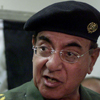Fifteen faces of the Iraq war. What happened next?
They were familiar figures of the Iraq war. A decade on from the start of the invasion, some have faded into obscurity while the legacy of others endures. Where are they now?
 George Bush
George Bush
Then: the speech delivered below a sign emblazoned “mission accomplished” on a US carrier in May 2003 was arguably the high point for the US president. Some critics argue that the eight-year-war that followed was one of America’s worst foreign policy blunders.
Now: the 66-year-old has started painting, mostly portraits of dogs and arid Texas landscapes, according to reports. He has an institute at the Southern Methodist University in Dallas. Compared to former presidents, Bush has barely been seen in public since leaving office. His nephew, George P Bush, plans to run for office in Texas.
 Tony Blair
Tony Blair
Then: the former British prime minister told MPs on 18 March 2003 that it was “palpably absurd” to believe Saddam Hussein had destroyed his weapon piles. It set in motion a foreign policy mission that dominated his second term.
Now: an official peace envoy to the Middle East, Blair set up the Tony Blair Faith Foundation and maintains that the world is safer without Saddam Hussein. As well as lecturing at Yale University, he has worked for JP Morgan and the insurance company Zurich.

Donald Rumsfeld
Then: emboldened by swift military action in Afghanistan a year earlier, the then US defence secretary set his sights on Saddam Hussein, citing links to 9/11. Much of the aftermath of the invasion happened on his watch, including the sectarian bloodshed and the prisoner abuses at Abu Ghraib. He was forced out in November 2006, after the Democrats recaptured congress.
Now: set up the Rumsfeld Foundation to encourage people to run for public service. In his 2011 memoirs, he wrote of 9/11: “I had no idea if Iraq was or was not involved, but it would have been irresponsible for any administration not to have asked the question.”

Condoleezza Rice
Then: operating inside a macho neocon administration, America’s national security adviser denied ignoring CIA warnings of increased terrorist activity in months before 9/11. She replaced Colin Powell as secretary of state in 2004.
Now: she was mooted as a running mate for John McCain in 2008 presidential election. The following year she returned to Stanford as a political science professor, becoming director of its Global Center for Business and the Economy. In 2011 she played a cameo role on the NBC sitcom 30 Rock.

Paul Wolfowitz
Then: a prime intellectual architect of the Iraq war. Like many neo-conservatives, he envisaged a democratic government in Baghdad that would spread across the Arab world and foster better relations between Israel and Palestine.
Now: left George Bush’s administration in 2005 to become president of the World Bank. His tenure ended abruptly less than three years later, amid charges he had used his position to arrange a promotion for his girlfriend. Now a scholar at the American Enterprise Institute.

Kofi Annan
Then: the UN secretary general kept a notably low profile in the run-up to war. Three weeks after the invasion he expressed regret that Tony Blair had not secured a second UN resolution. He has since said that the war was “without global legitimacy or foresight”.
Now: left the UN in 2006 and has since established the Global Humanitarian Forum, for which he is president. Appointed UN-Arab League envoy to Syria but resigned six months later. His memoirs describe America’s depiction of Iraq’s threat as “a self-inflicted wound of historic proportions”.

Lord Hutton
Then: chaired the inquiry into the death of Dr David Kelly, who committed suicide shortly after he was exposed as the source of a BBC story suggesting that the government had “sexed up” an intelligence document. Lord Hutton’s final report in January 2004 lambasted the BBC, leading to the resignation of chairman Greg Dyke. It also appeared to exonerate the government.
Now: aged 81, Lord Hutton is retired. In 2006 he said his critics failed to take into account his terms of reference, which prevented any investigation into the reliability of intelligence.

Clare Short
Then: 11 days before the invasion, the then international development secretary insisted she would quit the cabinet if Britain went to war without a clear UN mandate. But she was still on the front bench when the troops went in, losing much respect among the left, particularly after Robin Cook’s dramatic earlier resignation. Short finally resigned on 12 May, nearly two months after the invasion.
Now: became a vehement critic of new Labour, and has since criticised Tony Blair and the then attorney general, Lord Goldsmith, who she alleged misled her and other MPs in order to obtain consent for the Iraq invasion.

Hans Blix
Then: the Swede came out of retirement to inspect Iraq’s weapons facilities. After giving Saddam Hussein a clean bill of health, the neocons ordered a CIA probe into his background. His reporting was cut short in the rush to war.
Now: Blix left the UN in 2003, and founded the Stockholm-based Weapons of Mass Destruction Commission, an independent Swedish think tank. He is also involved in overseeing the United Arab Emirates’ atomic energy programme. He recently described Iraq as a “tragic and terrible mistake”.

Mohammed Saeed Al-Sahhaf
Then: few elements of the Iraq invasion were as surreal as the briefings from Saddam Hussein’s information minister. Even as tracer-fire lit the skies and coalition tanks rolled into Baghdad, the bespectacled official held daily briefings insisting Iraq was in the ascendancy. It earned him a cult fan following, including George Bush, and won him the nickname “Comical Ali”.
Now: released soon after giving himself up to US forces in June 2003, he is understood to be living a far lower-profile life in the United Arab Emirates.

General Sir Mike Jackson
Then: highly respected after leading Nato troops into Kosovo, the army chief had to deal with claims of Iraqi prisoner abuse by UK troops in Basra, as well as the public’s growing resentment over the rising body count in Iraq.
Now: After retiring as head of the army in 2006 he criticised the US for having no post-invasion plan and the MoD for failing to understand the ethos of the armed forces. Now 68, he still consults and speaks widely on military matters.

Tariq Aziz
Then: Iraq’s foreign minister during first Gulf War was seen by many as the moderate front of Saddam Hussein. One of the deposed leader’s most trusted confidants, Aziz had risen to become deputy prime minister by 2003 until he surrendered to US forces shortly after the invasion.
Now: Aziz received the death penalty in 2010 for the persecution of Islamic opposition parties during Saddam’s rule. Now 76, he is currently being held at Camp Cropper in western Baghdad. His lawyers say he is suffering from depression, as well as diabetes and heart disease. Iraqi President Jalal Talabani has previously said he will never sign off on Aziz’s death sentence.

Lynndie England
Then: the junior reserve soldier from West Virginia was the female face of shocking photographs that emerged from Baghdad’s Abu Graib prison in 2004. One image included England with an Iraqi prisoner on a leash, while another showed her posing over a pyramid of naked prisoners.
Now: England served half of a three-year jail sentence before returning to her parents in West Virginia. In an interview last year she said of the former Abu Graib prisoners: “Their lives are better. They got the better end of the deal. They weren’t innocent. They’re trying to kill us, and you want me to apologise to them? It’s like saying sorry to the enemy.”

Dominique De Villepin
Then: as French foreign minister, he led the opposition to the war on Iraq, delivering a stirring speech at the UN in February 2003. By standing up to the might of the US superpower and its Anglo-Saxon ally Britain, he won the rare distinction of applause, and galvanised much of Europe to stand firm.
Now: an opponent of former French president Nicolas Sarkozy, in 2011 De Villepin put his hat in the ring for the French presidency but failed to secure enough support. He recently spoke out against France’s military mission to Mali, saying that Paris has failed to heed the lessons of history.

Muqtada Al-Sadr
Then: the Shia cleric rose to become one of the most influential political and military figures in post-Saddam Iraq. Bolstered by the support of Iraq’s empoverished Shia majority, he founded the powerful and anti-American Mahdi army. Paul Bremer, the US administrator in Iraq, declared al-Sadr an outlaw in 2004 and vowed that uprisings by his followers would not be tolerated.
Now: so powerful has al-Sadr become that he is indispensable to the new government, wileding significant influence in the Iraqi parliament. Many credited him when the US finally withdrew from Iraq at the end of 2011. Posters of the cleric have since been seen in Firdous Square – the area in Baghdad where the statue of Saddam Hussein was famously toppled in April 2003.
Kunal Dutta is a news writer and reporter based in London